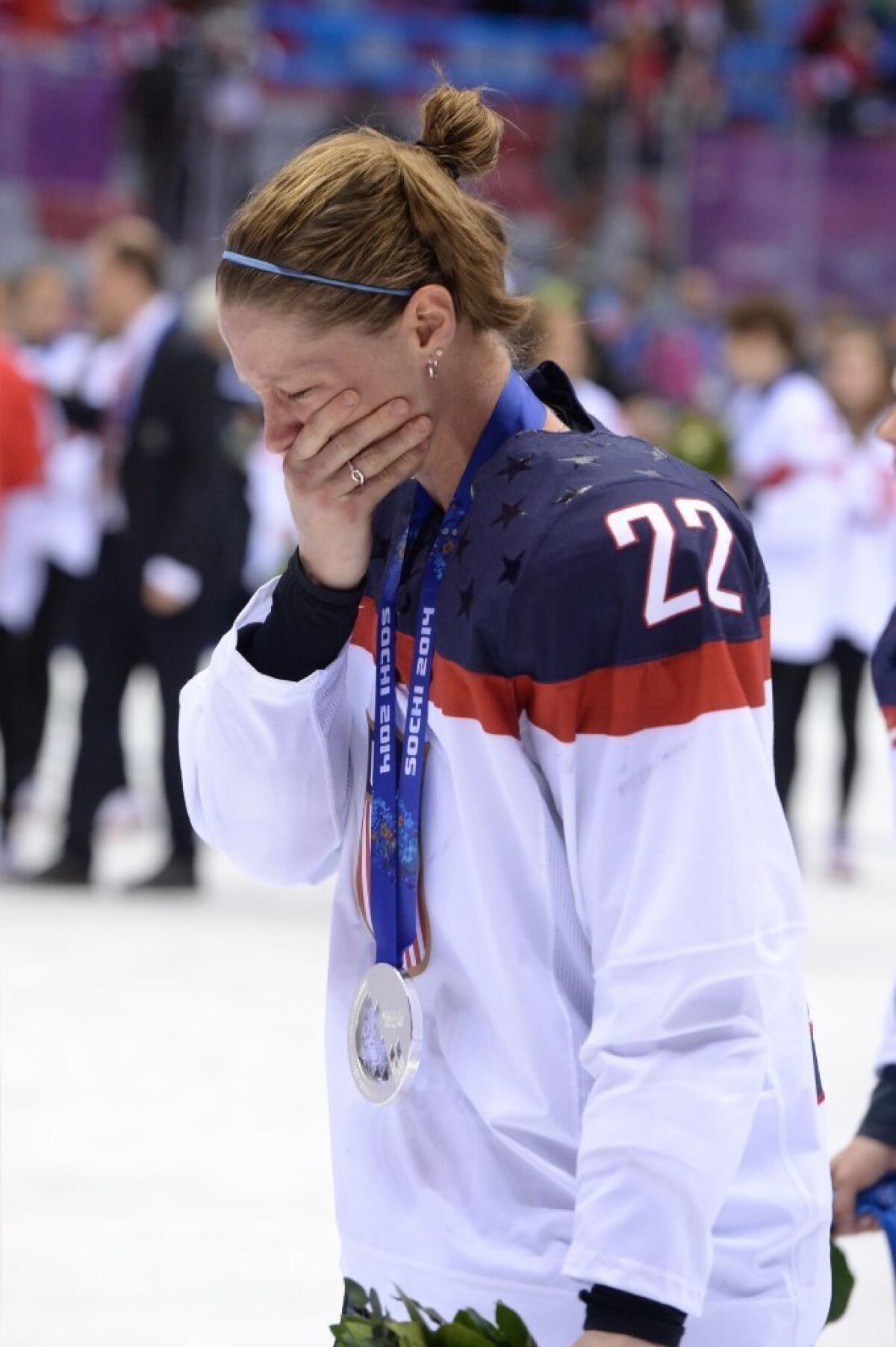U.S. womenâs Olympic hockey team: Yes, there is crying in hockey

When the U.S. womenâs hockey team lost the game that stood between them and a gold medal at the Winter Olympics in Sochi, Russia, they responded in a very normal way: They cried on the ice. Then they cried on the medal stand as silver medals were draped around their necks. And then clumsy sports commentators didnât know what to make of that and the blogosphere lit up with criticism.
âomg. The U.S. womenâs hockey team is crying! Thereâs no crying in hockey!!â wrote one self-satisfied wit â not the only one I came across who borrowed the famous Tom Hanks line about no crying in baseball from âA League of Their Own.â
But the criticism wasnât just that they were women crying; it was that they were athletes ungrateful to be getting second prize, the silver medal.
OK, letâs stop and think about this for a moment. You train your entire life to get to the Olympics, you out-compete U.S. athletes to get on the team, your team wins to get to the final game in the Olympics. You lead by two goals and are minutes, barely 3 1/2 of them, away from winning, when the Canadian team ties the score, forces overtime â and wins.
It was a stunning win for Canada. And a brutal loss for the American. The grief and raw pain on the American playersâ faces, so evident through their masks, was heartbreaking and riveting at the same time.
âWe didnât train as hard as we could for second place,â team captain Meghan Duggan said Friday.
Of course they didnât. And understandably, theyâre devastated they didnât win the gold. Why should they cover that up? Yes, there are some athletes who are just thrilled to be at the Olympics, who know â or suspect â that the nearest they will come to a medal of any color is if they get a chance to fondle one around the neck of a competitor. But if youâre a contender for a medal, you only got that far with extraordinary drive and focus and hard work. Criticizing these women for not smiling politely as they were awarded silver medals seems churlish, doesnât recognize the tremendous mental and emotional energy that they expended, and dismisses â to borrow the well-worn cliche of televised sports â âthe agony of defeat.â And it was a defeat.
It wasnât bad manners to cry at the medal ceremony. If they hadnât shown up at all for the medal ceremony, that would have been rude.
For all the great athletic feats weâve seen at the Olympics, itâs amazing how overly polished and slick and television-ready so many of the athletes look and act. The female athletes look made-up and blow-dried just minutes after hurtling down a ski slope. (Does Drybar have a pop-up salon in Sochi?) Their answers to TV reportersâ questions have been, with some fun exceptions, practiced and public relations approved.
So it was bracing to see a real and uncensored moment of emotion. And it was grim; the hockey players looked dejected and glum. Duggan clapped her hands over her face to hide her emotions on the medal platform. Other players wiped tears from their red eyes with their shirts. No blow-dried hair or blow-dried smiles for these young women.
But by Friday morning, members of the team were on NBCâs âTodayâ show, scrambling to respond to the criticism that they looked ungrateful and dutifully talking about how âfortunate and honoredâ they felt to represent the United States and win a silver medal.
In fact, they werenât the only silver medalists crying. Did anyone catch South Korean figure skater Yuna Kim weeping off-ice when she got the bad news that her own dazzling performance wasnât enough to catapult her to gold over Russiaâs Adelina Sotnikova, and she would have to settle for second place? And Kim already has a gold medal â won four years ago at the Winter Olympics in Vancouver. (Maybe there should be a rule against letting the same individuals compete again after they win gold at one Olympics. Give other people a chance. I think the Santa Cruz County Fair got it right with its annual Apple Pie Baking Contest â once you win first place in the 18-and-over category, you canât compete in that category again. Youâre done. You go to the masters category.)
Nor was it just women sobbing. Witness American skier Bode Miller who, after winning his umpteenth medal, choking up as he talked to a reporter about his brother, who died last year at age 29.
The point is these are all fierce competitors with a well of emotions inside. And theyâre all there to win. Itâs not unsporting for athletes to cry when they come up short. But it is unsporting to chastise them for it.
ALSO:
The Iran I saw--in 781 days in Evin prison
A costly pain in the neck and what it says about healthcare in the U.S.
More to Read
A cure for the common opinion
Get thought-provoking perspectives with our weekly newsletter.
You may occasionally receive promotional content from the Los Angeles Times.











